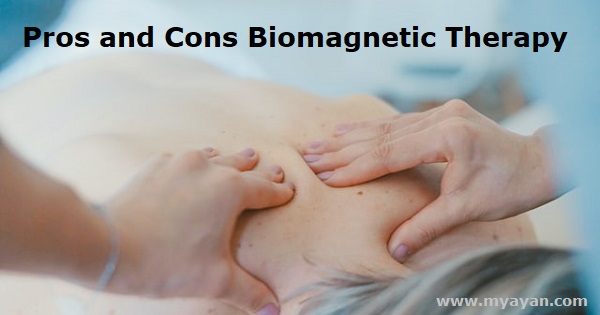Biomagnetic therapy is an increasingly popular alternative medicine that involves the use of magnetism to treat various ailments. This type of therapy uses magnets placed on or near the body to reduce pain and inflammation and even improve sleep. Though there are many potential benefits associated with biomagnetic therapy, it's important to remember that this treatment isn't scientifically proven and may not be suitable for everyone. Let's look at some pros and cons of biomagnetic therapy to help you decide whether to go for it or not.
Biomagnetic therapy is based on the principles of magnetic fields that are present in nature. It works by placing magnets on or near the body to help realign the body's natural energy field and restore balance. The idea behind this therapy is that when we experience pain, stress, or other ailments, it can be caused by a disruption in our energetic field. Using biomagnetic therapy to realign the energy field can reduce symptoms and promote healing.
The magnets used for biomagnetic therapy come in various shapes and sizes and vary in strength from low intensity to high intensity. They may be placed directly on the skin or held gently against a specific area of discomfort. The duration of treatment depends on the type and severity of the condition being treated.
There are several potential benefits associated with biomagnetic therapy, such as pain relief, improved circulation, and relaxation. It can also be used to reduce inflammation and promote faster healing from injuries. Here is a list of the pros of biomagnetic therapy:
Transcranial magnetic Stimulation (TMS) or magnetic therapy is usually done on an outpatient basis, so there's no need to stay in a hospital. No need to disrupt your daily and weekly regimen because treatment typically consists of just five weekly meetings. Each session is relatively short and won't interfere with the rest of your day. Moreover, you can carry on without any unpleasant after-effects whatsoever. With this kind of convenience, it's no wonder that so many are taking advantage of Magnetic therapy today.
Magnetic therapy is noninvasive, meaning it doesn't require surgery or medications. This makes it appealing for alternative treatments with minimal risks and side effects. So, if you're looking for a safe and effective way to treat a range of mental health issues, magnetic therapy offers an attractive solution. And given that you won’t have any discomfort during the procedure, is one of the main pros of Biomagnetic therapy.
Magnetic therapy can be used to treat a variety of ailments, including depression, anxiety, migraines, pain management, and even neurological disorders like Parkinson's disease. The effects tend to be cumulative, with many reporting benefits lasting long after treatment has stopped. With its range of potential applications, it's easy to see why magnetic therapy is becoming increasingly popular as an alternative treatment option.
Magnetic therapy is a safe, noninvasive treatment option. Reports of side effects are rare and usually mild in severity. Most commonly reported complaints include headaches, discomfort during the procedure, and increased anxiety levels. These effects typically resolve within a few hours and do not require medical intervention.
Despite its potential benefits, biomagnetic therapy does have some drawbacks that should be considered before beginning treatment. Here are some of the cons of biomagnetic therapy:
While anecdotal evidence suggests that magnetic therapy may offer some relief from certain kinds of pain or mental health issues, it has not been scientifically proven to work for everyone. There is also a lack of long-term studies on the efficacy of biomagnetic therapy.
Magnetic therapy can be expensive, especially if you need to purchase a magnet specifically for your treatment. Additionally, insurance may not cover it, and some doctors may not accept payment from patients who use magnetic therapy. Add more to the cons of biomagnetic therapy as the TMS therapy consists of at least 30 treatment that lasts up to 6 weeks.
Different magnets have different strengths and shapes, which may affect the treatment results. It is essential to ensure that you use the correct type of magnet for your particular condition to maximize its effectiveness.
Magnets can cause skin irritation or even tissue damage in rare cases if misused. Therefore, it is essential to use the correct type of magnet and follow the instructions provided by your healthcare provider. In addition, it should not be used near people with pacemakers or in areas with electrical equipment, as this could cause interference.
Pros and cons of biomagnetic therapy Conclusion
Overall, biomagnetic therapy is a safe alternative treatment that has the potential to provide relief from a variety of ailments. However, it is essential to consult your doctor before beginning therapy to ensure that you are using the best possible treatment for your needs. Additionally, research magnets thoroughly and discuss any safety concerns with your physician before use. By following these simple steps, you can maximize the potential benefits of biomagnetic therapy and enjoy improved health and well-being.

Due to its uncertain safety, pregnant women and young children should avoid magnetic field therapy. Anyone with a medical device or implant containing a magnetic field, such as a pacemaker, must also abstain from this type of treatment as it might disrupt the functioning of the implant.
Despite promising clinical trials that suggest magnet therapy may be effective in treating back pain, there's still no conclusive evidence to demonstrate it can effectively treat any medical condition.
Magnetic therapy should not be used in patients with a pacemaker or implanted defibrillator or those prone to metal allergies. Additionally, practitioners suggest refraining from using magnets near the abdomen for at least an hour after eating as it could potentially interfere with normal blood flow in the digestive region.
Transcranial Magnetic Stimulation (TMS) provides a revolutionary, noninvasive way to treat depression, obsessive-compulsive disorder, and other neurological conditions. Using magnetic field technology to affect brain activity directly, TMS has been proven effective in cases where traditional therapies have not yielded positive results. Put: It works when nothing else does.